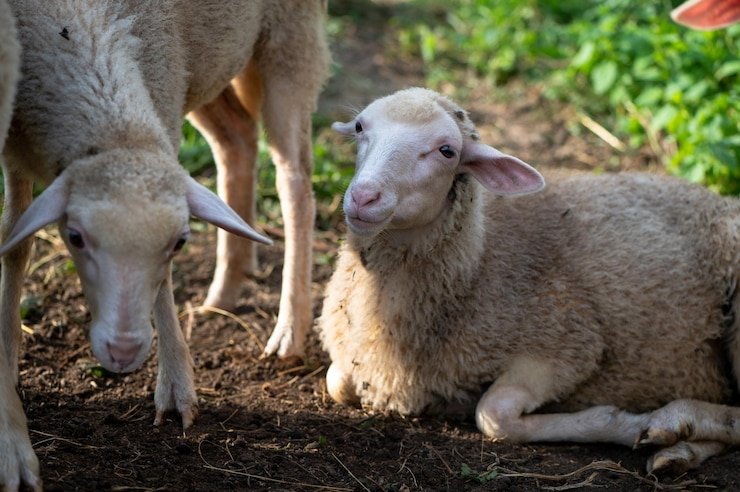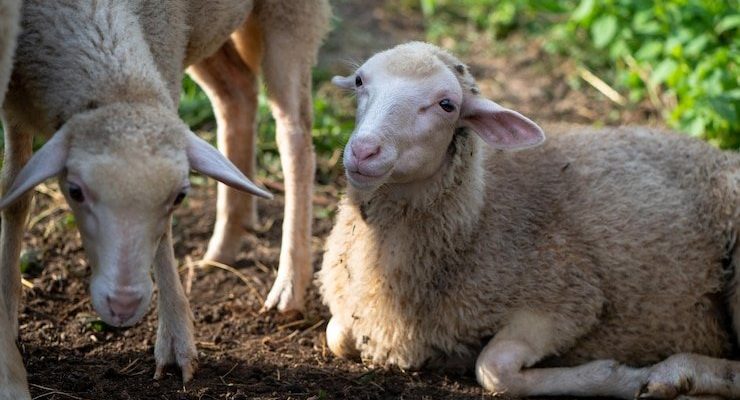
Imagine you’re out in the field, checking on your flock. One sheep looks a bit off. Its posture is a little odd, and it’s hanging back from the group. This is your cue to investigate. Just like we wouldn’t ignore our friends when they seem down, we shouldn’t overlook our sheep’s behavior. Let’s dive into how to spot if a sheep is sick and what you can do about it.
Common Signs of Illness in Sheep
Recognizing symptoms of illness in sheep is essential for prompt treatment. Sheep can’t tell us when they’re feeling poorly, so we need to be observant. A few common signs include:
- Change in Appetite: If your sheep suddenly refuses to eat or drink, it’s a red flag. Healthy sheep should munch on grass or hay regularly.
- Abnormal Behavior: Look for changes in behavior. Is the sheep separating itself from the flock? Is it more lethargic than usual? These can be signs of illness.
- Physical Symptoms: Check for coughs, runny noses, or diarrhea. These can indicate respiratory infections or digestive issues.
Staying alert to these behaviors can help you catch any health problems early. A sheep that seems disengaged or off-beat might just be having a bad day, but it’s worth investigating further.
Understanding Specific Symptoms
Let’s break it down further. Each symptom can indicate different health issues. For instance, a sheep with a cough could be suffering from pneumonia, while one with diarrhea might have a digestive problem or internal parasites. Common symptoms to watch for include:
– Bloating: This may indicate a serious digestive issue. Bloating can be dangerous and should be addressed immediately.
– Lameness: If a sheep is limping or reluctant to move, it could be dealing with foot rot or other hoof issues. Regular hoof care is essential for sheep health.
– Fleecy Changes: Pay attention to the wool. If it looks dull or matted, the sheep might not be getting the nutrients it needs.
Being familiar with these specific signs can help shepherds narrow down the possible issues more quickly. It’s like becoming a detective in your flock’s health!
Behavioral Changes to Note
Sometimes, it’s all about the sheep’s behavior. Animals have their own personalities, and any shift can be a warning signal. A sheep that’s normally social and lively but suddenly isolates itself might be sick. Other behavioral changes may include:
– Increased Aggression or Nervousness: If a previously calm sheep becomes aggressive, this could indicate discomfort or pain.
– Restlessness: A sheep that can’t settle down and keeps moving around may be trying to tell you something’s not right.
– Unusual Vocalization: If a sheep is bleating more than usual, it’s worth checking in on it.
These behavioral clues can often lead you to some straightforward fixes or point to a more significant health concern. Just think of it as your sheep trying to talk to you!
Common Illnesses in Sheep
Understanding common illnesses can help you respond effectively when you detect symptoms. Here are a few conditions to be aware of:
– Foot Rot: This painful infection can make walking difficult for sheep. If you notice limping or swelling between the toes, it’s time to seek treatment.
– Pneumonia: Watch for coughing and nasal discharge. This respiratory illness can be serious, especially in young or stressed sheep.
– Worm Infestation: If you see weight loss, bloated abdomens, or diarrhea, internal parasites could be the culprit. Regular deworming is often necessary to keep the flock healthy.
Being aware of these common ailments allows you to take swift action. It’s like having a first-aid kit ready for any situation you might encounter.
How to Diagnose a Sick Sheep
Diagnosing a sheep’s illness often starts with observation. Look closely at the sheep’s overall condition and behavior. Here’s how to approach it:
1. Conduct a Physical Examination: Check for signs like temperature, respiratory rate, and mobility. A healthy sheep typically has a temperature between 101.5°F to 103.5°F.
2. Check Nutrition and Environment: Assess the diet you’re providing. If it lacks essentials, your sheep might be showing signs of malnutrition. Also, ensure they have access to clean, dry bedding and clean water.
3. Isolate if Necessary: If you suspect one sheep is sick, consider isolating it from the flock. This prevents the potential spread of contagious diseases.
Taking these steps can help you identify the issue more accurately. Think of it as putting together a puzzle—each piece gives you more clarity.
Solutions and Treatments
Once you identify that a sheep is sick, it’s time to take action. Treatment will vary based on the diagnosis. Here are some general solutions:
- Consult a Veterinarian: For serious conditions, always reach out to a vet. Professional advice is invaluable and can save your sheep’s life.
- Provide Supportive Care: Ensure the sheep stays hydrated and comfortable. Sometimes, a warm environment or extra bedding can help.
- Adjust Diet: If malnutrition is suspected, consider a nutrient-rich supplement or forage that meets their needs.
Taking these proactive steps can significantly improve your sheep’s chances of recovery. Remember, the quicker you act, the better the outcome.
Preventing Illness in Your Flock
Prevention is always better than cure. Regular check-ups and good management practices are key. Here are some preventive measures to consider:
– Vaccination: Ensure your flock is up to date on vaccinations for common diseases. This helps build their immunity and reduce the risk of illness.
– Balanced Diet: Provide a well-rounded diet that includes minerals and vitamins. Healthy sheep are less likely to fall ill.
– Regular Health Checks: Get into the habit of checking your sheep regularly for any signs of illness. Early detection is crucial.
By implementing these preventive measures, you can help maintain a healthy flock and reduce the chances of future health issues. Think of it as nurturing a garden; the better care you provide, the healthier and more vibrant the results!
In conclusion, being able to recognize when a sheep is sick is a vital skill for any shepherd. By observing their behavior, knowing the common symptoms, and acting quickly, you can ensure your flock stays healthy and happy. Whether you’re a seasoned shepherd or just starting out, these insights will help you build a strong connection with your animals—just like a good friendship built on trust and care. So grab your boots, head out to the field, and keep an eye on those woolly companions!

